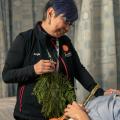Tuberculosis
An overview of Providence Health Care’s services and resources for patients experiencing tuberculosis.
Overview
Tuberculosis (TB) is caused by a type of bacteria that spreads through the air.
TB impacts the lungs, although it can also impact other areas of the body. It is a serious illness that can be deadly if not treated properly.
About 250 to 300 cases of active TB are diagnosed in British Columbia each year. People with an HIV infection are at increased risk of getting TB. This is because of a weakened immune system.
Antibiotic medicines can cure active TB. Medicines can stop the spread of TB and keep latent TB from becoming active.
Support services
Support for Indigenous Peoples
The Indigenous Wellness Liaison Team is here to support your health journey. Team members offer cultural support and healthcare advocacy. Learn more below or call them at 604-682-2344,62937 or email IWL@providencehealth.bc.ca.
Education & resources
Patient education
Clinical trials & research
Advances in tuberculosis treatments are all thanks to medical research. While participating in research is a decision you should make for yourself in consultation with your care team, there is much activity in this area so please ask us about our research programs if you’re interested.
By taking part in research, you can help us all learn more about tuberculosis and find better ways to help people like you live and thrive with the condition. While you cannot assume benefit to yourself, your participation can make a difference in improving care for future patients.
The following clinical trials are currently enrolling volunteers. Please ask your care team for more information or contact the research team listed on each study or trial. For other information about research at Providence Health Care, please visit Providence Research.
News & stories
Last reviewed: February 8, 2024
